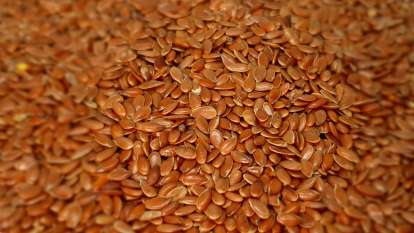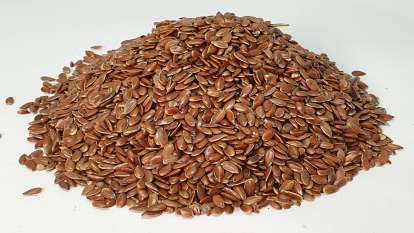Flaxseed
Flax seeds are rich in fiber, protein and Omega-3 fatty acids and have multiple physical and mental health benefits, which is why they are used both for food and medicinal purposes - to maintain a healthy lifestyle and prevent neurological and cardiovascular diseases - and in cosmetics, where their anti-inflammatory and anti-oxidant properties improve the overall appearance of the skin.
What are flax seeds?
Linseed (the fruit of the perennial herbaceous plant flax, Latin Linum usitatissimum - extremely useful flax) is rich in protein, cellulose, fiber, potassium, magnesium, vitamins (C, E, K, B8 - choline, B9) and monosaturated and polyunsaturated fatty acids (including Omega-3 fatty acids). According to historical data and studies, flaxseeds have been used by humans since ancient times, both for nutritional purposes - flaxseed meal (from which various foods could be made - pies, cakes, biscuits) and for medical and cosmetic purposes - flaxseed oil (used, for example, to treat constipation or other colon disorders, but also to control acne), originating from the areas adjacent to the Mediterranean and Black Seas.
Where can it be sourced?
Flaxseed is now grown in many parts of the world - globally, Kazakhstan (29%) is the leading producer of flaxseed, with about 933,533 metric tons annually, followed in descending order by Canada, Russia and China. Flaxseed (i.e. flaxseed oil) can be purchased from both local health and health food stores and simple local shops or supermarkets.
How can they be consumed?
Flaxseed (or flaxseed oil) can be eaten either ground (easier to digest) or whole (digested over a longer period of time, with the possibility of elimination from the body in whole form) in various combinations: flaxseed oat bread, chia and flaxseed pudding, banana and flaxseed pancake, flaxseed crusted schnitzel, flaxseed hummus, flaxseed with yogurt, flaxseed with yogurt, flaxseed with kefir, flaxseed and milk cereal, homemade flaxseed chips, flaxseed granola bars, flaxseed soups and broths, flaxseed muffins and biscuits, flaxseed pancakes and cakes, ground flaxseed smoothies, flaxseed oil sprinkled on various foods - recommended to avoid exceeding 50g of flaxseed per day (adults), 30g per day (children) and 20g per day (pregnant or breastfeeding women).
Flaxseed nutritional values (per 100g)
Nutritional values:
- Calories: 534 kcal- Protein: 18,3 g
- Carbohydrate: 28.9 g
- Fat: 42,2 g
- Fiber: 27,3 g
- Carbohydrates/Sugars: 1,5g
Vitamins:
- Vitamin C: 0.6 mg- Vitamin E: 0,3 mg
- Vitamin K: 4,3 µg
- Vitamin B1: 1.6 mg
- Vitamin B2: 0.2 mg
- Vitamin B3: 3.1 mg
- Vitamin B5: 1 mg
- Vitamin B6: 0.5 mg
- Vitamin B8: 78.7 mg
- Vitamin B9: 87 mg
Minerals:
- Calcium: 255 mg- Iron: 5,7 mg
- Phosphorus: 642 mg
- Magnesium: 392 mg
- Potassium: 813 mg
- Selenium: 25.4 µg
- Sodium: 30 mg
- Zinc: 4.3 mg
Benefits of flaxseed consumption
Flaxseed (or flaxseed oil) has a multitude of benefits, both physical and mental, improving skin appearance, digestion and neurological functions, treating constipation, helping people who want to lose weight, preventing cancer, diabetes and cardiovascular disease, regulating blood pressure and cholestorol levels, while reducing inflammation and overall detoxification.
Improve digestion
Flaxseed, due to its nutritional variety, facilitates intestinal transit, stimulating, cleansing and regenerating the digestive tract, helping to eliminate toxins from the body and contributing to its overall well-being - therefore constipation, resulting from a low-fiber diet, is resolved following consumption of flaxseed.Helps lose weight
Flaxseeds provide a feeling of satiety, reducing the sensation of hunger and appetite, thus making it easier for people who want to lose weight - one study has shown that a minimum of 10-20g of flaxseed is needed to achieve this effect.Prevent cancer
Flaxseed, thanks to its high intake of lignans (polyphenolic compounds found in fibres from plant sources) - characterized by antioxidant properties - considerably reduces the risk of cancer (colon, skin, prostate, breast and many other types).Detoxifies the body
Flaxseeds, thanks to their nutritional variety (high amounts of protein, fiber and Omega-3 fatty acids) and their antioxidant, laxative and depurative properties, cleanse the body of toxins, balancing and restoring health.Improve brain function
Flaxseed relieves the body of stress, improving overall brain function, reducing inflammation and stimulating blood circulation - flaxseed also makes it easier to treat neurological conditions such as depression.Regulates cholesterol levels
Thanks to their high fiber content, flaxseed not only reduces bad (LDL) cholesterol levels in the blood, but can also increase good (HDL) cholesterol levels - effects found in studies of individuals consuming 30g and 10g of flaxseed powder daily for three months.Regulates blood pressure
Flaxseed competes with anti-hypertensive pharmaceutical treatments by naturally lowering blood pressure - reducing the risk of death. the risk of death from stroke by 10% and the risk of death from heart disease by 7%.Prevent diabetes
Flaxseed, due to its high insoluble fiber content, reduces blood sugar levels and the rate at which it is released into the body - studies have shown that several individuals with type 2 diabetes who consumed 10-20 grams of flaxseed powder daily for at least one month experienced an 8-20% reduction in blood sugar levels.Improve skin appearance
Flaxseed oil, applied topically to the skin, heals the skin, preventing skin degeneration, facilitating cellular replenishment - it also cleanses the skin and regulates sebum production, which in tandem with its anti-inflammatory properties, helps control and treat acne, thus greatly improving the appearance of the skin.
Risks and contraindications
Flaxseed (i.e. flaxseed oil) is not recommended for pregnant or breastfeeding women, people suffering from gastrointestinal obstruction, esophageal stricture, gastrointestinal tract bleeding or prostate cancer - excessive consumption of flaxseed (more than 30-40g daily, consistently) can cause a multitude of side effects, including bloating, constipation, flatulence, nausea, diarrhea, and abdominal pain. It is recommended to consult your doctor and seek consent before consuming flaxseed or flaxseed oil.
Conclusion
Flaxseeds (also flaxseed oil) are beneficial for humans, improving a variety of aspects of the body's health, as long as contraindications are taken into account and they are consumed, with the consent of a doctor or accredited health care professional, in moderation, in optimal and safe amounts.
Flaxseed benefits:
- laxative
- anti-oxidant
- anti-inflammatory
- depurative
- anti-tussive
- anti-hemorrhoidal
Flaxseed side effects:
- bloating
- constipation
- flatulence
- nausea
- diarrhea
- abdominal pain
Flaxseed contraindications:
- esophageal stricture
- gastrointestinal obstruction
- gastrointestinal tract bleeding
- laxative pharmaceuticals
- purgative pharmaceuticals
- pregnant women
- breastfeeding women


Comments